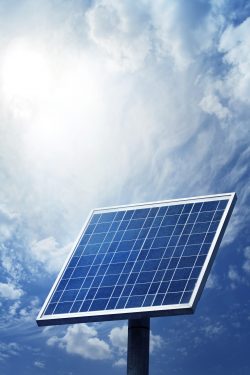July 31, 2019 | Energy
 In the past decade, there has been an increase in the number of initiatives and legislation from the government to encourage renewable energy throughout United States. This along with increased awareness about the environmental advantages of renewables, the ability to off-set high electric bills, and other benefits such as supporting local businesses and becoming energy self-reliant have increased the popularity of solar as an alternative energy source. With the wide variety of solar programs and options available to choose from, most common dilemma for a consumer is which form of Solar system to opt for. This brings us to the question of Rooftop versus community solar. To explore this further, we need to explain what community solar exactly is.
In the past decade, there has been an increase in the number of initiatives and legislation from the government to encourage renewable energy throughout United States. This along with increased awareness about the environmental advantages of renewables, the ability to off-set high electric bills, and other benefits such as supporting local businesses and becoming energy self-reliant have increased the popularity of solar as an alternative energy source. With the wide variety of solar programs and options available to choose from, most common dilemma for a consumer is which form of Solar system to opt for. This brings us to the question of Rooftop versus community solar. To explore this further, we need to explain what community solar exactly is.
A community solar project sometimes referred to as Solar garden or shared renewable is a power plant where the electricity produced is shared by one or more households, or customers. It is important to understand there are four different types of community solar programs:
Rooftop panels are mounted on the rooftops of the house or apartment and are connected to a local power grid or run as standalone systems. One can either buy these panels, finance the system through a loan or just opt for a power purchase agreement (PPA) where you pay for the electricity generated rather than the panels. Now that we understand the basic difference between the two installations, lets discuss the pros and cons for each to better let you decide which suits you the best.
In rooftop solar, pitch of the roof, shading due to trees around the house, dirt and mounting are some factors that affect the efficiency of the system. For best results, it is advised to place the panels facing south direction, with little or no shading and the panels should be cleaned periodically. Currently the maximum efficiency of the panels is around 22%. There has been ongoing research to increase panel efficiency for effective solar energy production. The average cost of a panel is $3.93 per watt (may vary depending on the state). Community solar on the other hand is an alternative for those who want to invest in renewable energy without having to install anything in their home. This is a lucrative option for renters and small business owners as there are options for short term contracts allowing more flexibility. Community options eliminates the installation and maintenance costs and are usually set up in locations to maximize efficiency.
Having said this, whether to opt for rooftop or community solar is an individual choice. There is no right way, what may be best for you might not be the best choice for someone else. Just consider your options and evaluate the pros and cons and choose what works for you. Either way you will be contributing to promoting renewable energy and a safer future for the generations to come!
APOGEE INTERACTIVE, INC. © 2023. ALL RIGHTS RESERVED